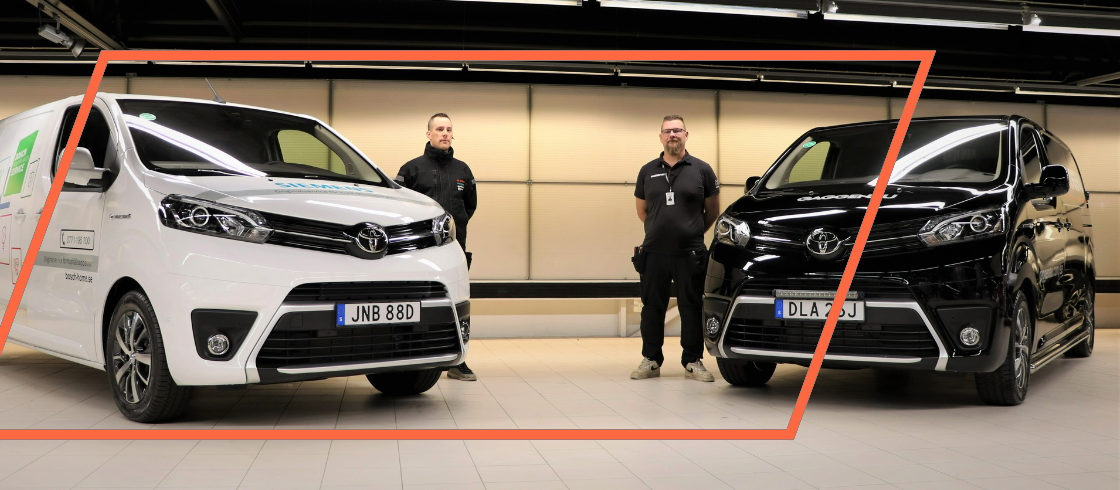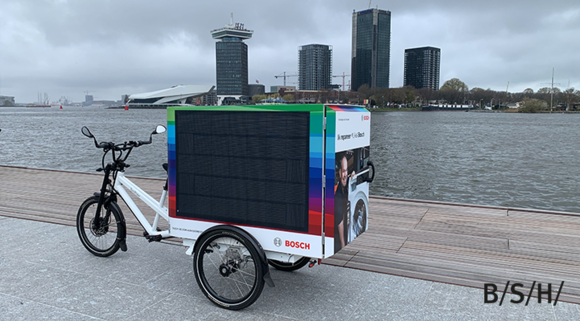More sustainability with electric service vans at BSH Sweden
Reading time: 5 minutes
As Europe's No. 1 home appliances innovator, BSH tries to reduce the environmental footprint in all areas of the value chain. That includes the use of resources, emissions, and energy consumption because every aspect of business is worthy of a review of its environmental compatibility and improvement on our path to reaching new climate goals. This aim of course affects the technician service too, so when the diesel vans of BSH Sweden started to expire in the beginning of 2021, the service team got the chance to choose Toyota as a supplier for the technician service and electric vans suddenly became a reality.
The local Purchasing and Customer Service at BSH Sweden agreed to run a pilot with the main goal to understand if it would be sustainable and practical for their technicians to use electric vans. Over the last months, the first three eagerly awaited electric vans arrived and were delivered to our technicians taking part in the pilot.
Birgitte Bork Sörensen, Head of Communications Northern Europe at BSH, checked in with the team to see how it is going so far.
„Service is happy“ – Colin Embling, Head of Customer Service.
He further adds: " We are relieved to get the pilot started. For Customer Service sustainability is at the very heart of what we do. We offer services and solutions to prolong the life of our appliances. However, we should also strive to ensure our processes are more sustainable and support the goal of BSH: To reduce our environmental footprint. With this pilot, up here in the North, we will find out if the technology, as far as it has developed today, can support this goal.“
„With this vehicle model, we found a good match for our defined needs, for example, room enough for the technicians’ equipment and the different spare parts they need for the repairs. Busy technicians and fewer places to charge mean, we also need to have the right driving range to manage a full day’s schedule of repairs. This model has a range of 330 km with a fully charged battery. This means that for this pilot we had to choose technicians who have an average driving range of approximately 150 km per day and only a few days above 200 km. Even the charging possibilities at or nearby the technicians’ homes is an important factor to consider. Spare parts are delivered during the night and loaded into the back of the vans - ready for repairs the next day. Due to that, the vans need to be parked more or less at the same spot by the end of each working day. Unfortunately, the publicly accessible charging possibilities in the Swedish metropolitan areas are not where we need them to be yet. So right now, only technicians with proper charging possibilities at or nearby their home qualify for this test project,” Daniel Molnstedt, Nordic Purchaser and Fleet Manager at BSH Sweden, explains.
All three technicians joining the pilot have charging possibilities at their homes and they have chosen suppliers delivering 100% renewable energy, which means there will be no CO2 footprint from charging the vans.
What is the impact one month into the pilot project?
According to calculations by Daniel Molnstedt, leader of the pilot, the CO2 saving will be considered approximately 14.500 to 16.000 kg per year: "We considered the Bosch factor of 2.67 kg CO2 per liter of diesel and the yearly consumption of diesel for the three vans (5.500 to 6.000 liter). And if we look at the financial savings of the electric vans right now, they cost between 0,5-1,2 SEK (Swedish crowns) per kilometer in energy consumption, depending on the technicians’ agreement with their energy suppliers. In comparison, today a diesel van costs approximately 2,0 SEK per kilometer. The leasing cost for the vans is more or less the same for both diesel and electric models.“Birgitte Borg Soerensen states.
„So far, the new vans have been positively received by our technicians and consumers, recognizing that we as a company are taking responsibility for reducing our CO2 footprint.“ Colin Embling explains.
Daniel Molnstedt: “This makes us even more convinced that we are on the right path. We are now looking into improving other processes to reduce the daily driving range of our technicians, for example, minimizing the distance between each repair visit. If we manage to optimize the driving range further, we will be able to get more technicians to join the project”.
If this pilot shows that the electric service vans have great potential, we
believe, we will run pilots in other Nordic countries. Eventually, the ultimate goal is to have a full fleet of electric service vans in Northern Europe.




